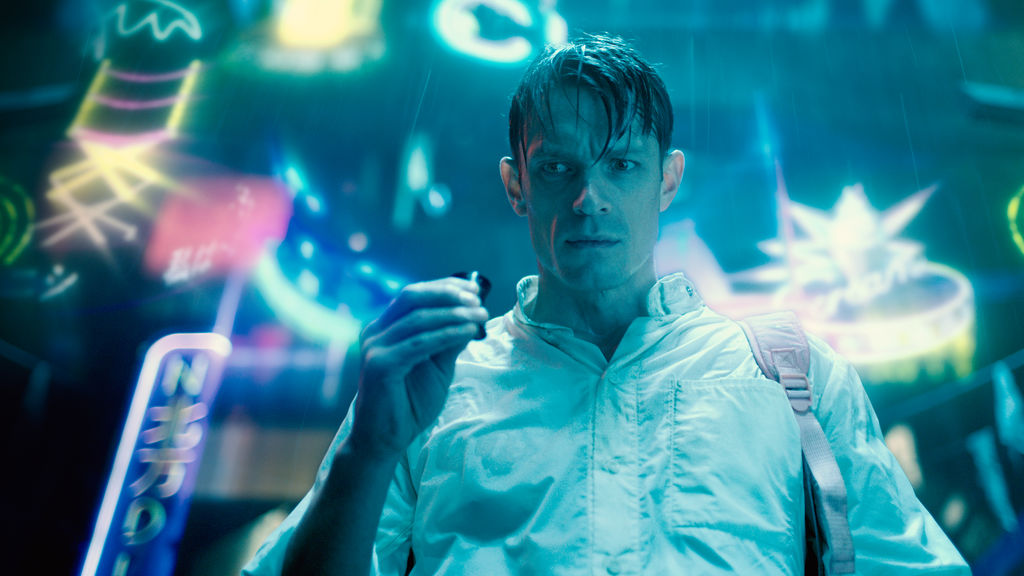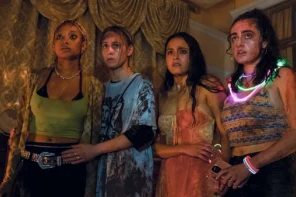Between the relatively recent releases of Blade Runner 2049 and Ghost in the Shell, as well as the approaching launch of Annihilation, we could say that the public has had its dose of ambitious science-fiction for the years to come. In the midst of this obsession with futuristic dramas and their philosophical approach to humanity, Netflix gave birth to Altered Carbon, its latest big-budget, 10-episodes original series. While its inspirations in the aforementioned movies and similar universes are obvious, is Altered Carbon worth watching as a standalone and unique TV show, trying to put forth its own take of an overdone genre?
In the world of Altered Carbon, advances in technology have allowed human consciousness to be contained in small devices called stacks. By placing these stacks directly in the back of the neck, humans can now inhabit multiple bodies, as long as the device stays intact. Because death itself has lost all meaning, bodies have simply become a mean to an end, sleeves that you throw out when damaged. Of course, not everyone has access to unlimited bodies – the wealthiest can artificially extend their lives, while the poor might wait hundreds of years in cryogenic sleep, until a sleeve is available. It’s in this context that Takeshi Kovacs is woken up in a new body and charged to solve the complex murder of a rich businessman.
Identities are swapped, characters are cloned and born anew – Altered Carbon’s genius resides in its ability to lead viewers astray amid a plethora of twists.
Don’t dive into Altered Carbon looking for revolutionary science-fiction – the show has simply picked its influences in what the genre does best. The typical tropes are here rehashed: the habitual schism between wealthy and underprivileged is served once again, along with the usual flying cars and laser guns. While the combination of these elements allows Altered Carbon to build a coherent and breathing world, its universe falls short of being unique. The show is therefore overshadowed by a slight feeling of déja-vu, fortunately balanced by the audacious decision to use stacks as plot drivers.
As you can indeed imagine, such a choice allows for endless narrative possibilities. Identities are swapped, characters are cloned and born anew – Altered Carbon’s genius resides in its ability to lead viewers astray amid a plethora of twists. While these elements aren’t novel in the field of television, the show is usually well-rhythmed, apart from flashback episodes that tend to be a tad too long. These surprising situations give Altered Carbon a welcome touch of complexity, by enlarging the depth of the storyline.
While proposing a real reflection on the meaning of death or exploring the social issues of its futuristic world, Altered Carbon sticks to superficiality by using the stacks as simple plot devices rather than meaningful subjects of discussion
However, Altered Carbon’s showstopper might come from its production design – Netflix has taken out the big bills and its newborn TV show might be one of the biggest-budget and best looking sci-fi epic to date. To put it simply, Altered Carbon resembles a miniature Blade-Runner, seeping bright neon and never-ending rain. Bay City, where most of the series take place, heavily draws from the modern and futuristic metropolises of Blade Runner or Ghost in the Shell, where cultures have collided and enormous buildings sport bright advertisements. Its world is a sprawling take on typical science-fiction scenery: Altered Carbon will take you from endless stretches of towering urban settlements to lush forests on distant space colonies.
Despite its entertaining storyline and jaw-dropping visuals, the show has one major downside – its lack of elaboration on the themes discussed. While proposing a real reflection on the meaning of death or exploring the social issues of its futuristic world, Altered Carbon sticks to superficiality by using the stacks as simple plot devices rather than meaningful subjects of discussion. The absence of true reflection results in a scenario that is effective, but that unfortunately does not live up to the expectations. This lack of development is one of Altered Carbon’s most frustrating points: while the end result is certainly likeable, it hurts to think that it could have been so much more.
While the show won’t receive any Emmy awards for its acting that generally roams around the acceptable and underwhelming scenario, its generally pleasing pace, smart plot construction and wonderful production design will keep you stuck to your screen. Just remember that Altered Carbon is an effective melting pot of elements you’ve seen before, drawing inspiration from both the best and worst of science-fiction. If you ever feel like procrastinating on a Sunday morning without teasing your brain, this is as good as it gets.








